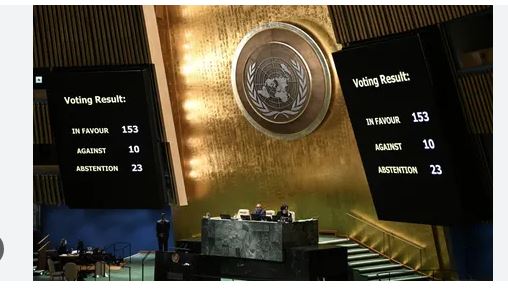
Israeli war on Gaza: US objects to wording in UN resolution for ceasefire
text_fieldsA resolution seeking a sustainable cessation of hostilities between Israel and Hamas, and Israel’s war on Gaza, at the United Nations Security Council faced a hurdle after the US raised objections to the wording of the resolution.
The US preferred 'suspension of hostilities' instead of the original 'cessation of hostilities' found in the resolution."
The Arab countries involved in negotiations expressed optimism at the apparent efforts from the White House to find phrasing that could garner U.S. support, a departure from the previous stance of outright vetoing resolutions.
This shift in approach reflects a growing divide within the U.S. administration, with some officials acknowledging a widespread sense of disillusionment in the Global South over perceived American hypocrisy in condemning Russian actions in Ukraine while justifying large-scale killings in Gaza by Israel.
The internal discord within the U.S. administration has led to diplomatic visits to Jerusalem, where U.S. diplomats have sought to persuade the Israeli government to adopt alternative military tactics.
However, these efforts have seen only limited success. A potential U.S. endorsement of a suspension of hostilities at the UN would signal frustration with the Israeli government's actions.
The U.S. has previously rejected cessation of hostilities resolutions at the Security Council due to the absence of clear criticism of Hamas for its role in the killing of more than 1,000 Israelis, including many women and children on October 7. The latest draft, presented by the United Arab Emirates, condemns all acts of terrorism and calls for the unconditional release of all hostages.
Meanwhile, U.S. Defense Secretary Lloyd Austin has engaged in talks with Israeli officials, urging a shift away from large-scale aerial and ground operations in Gaza to a new phase focused on the precise targeting of Hamas leaders.
Austin emphasized that the goal is to prevent Hamas from projecting terror into Israel, asserting that protecting Palestinian civilians in Gaza is both a moral duty and a strategic imperative.
This development follows remarks from President Joe Biden, who warned last week that Israel's "indiscriminate bombing" was eroding international support. The conflict in Gaza, where the death toll is approaching 20,000, has prompted a series of visits from senior figures in the Biden administration to Israel.
Simultaneously, in response to a series of attacks by Yemen's Houthi rebels disrupting trade in the Red Sea, the United States has announced the launch of a multinational force. The coalition, comprising Bahrain, Canada, France, Italy, the Seychelles, and the United Kingdom, aims to protect trade routes in the region.
The initiative comes after the U.S. and UK navies reported shooting down 15 drones in the waterway over the weekend.
The Iran-backed Houthi rebels have escalated drone and missile attacks on vessels in key shipping lanes, targeting those with alleged links to Israel or Israelis. At least 12 shipping companies, including major players like Mediterranean Shipping Company, CMA CGM, and Maersk, have suspended transit through the Red Sea due to safety concerns.






















